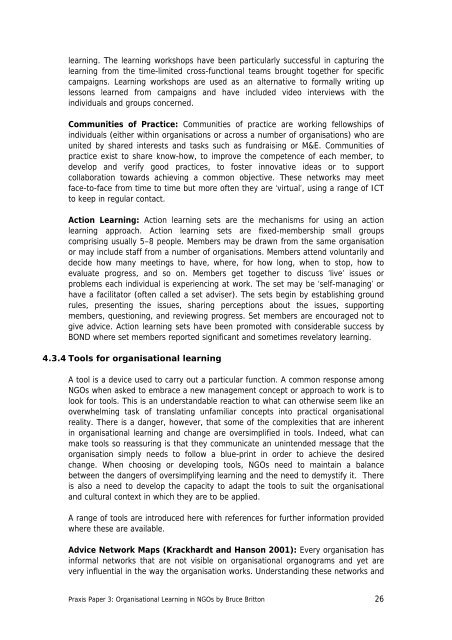Organisational Learning Discussion Paper - Are you looking for one ...
Organisational Learning Discussion Paper - Are you looking for one ...
Organisational Learning Discussion Paper - Are you looking for one ...
You also want an ePaper? Increase the reach of your titles
YUMPU automatically turns print PDFs into web optimized ePapers that Google loves.
learning. The learning workshops have been particularly successful in capturing the<br />
learning from the time-limited cross-functional teams brought together <strong>for</strong> specific<br />
campaigns. <strong>Learning</strong> workshops are used as an alternative to <strong>for</strong>mally writing up<br />
lessons learned from campaigns and have included video interviews with the<br />
individuals and groups concerned.<br />
Communities of Practice: Communities of practice are working fellowships of<br />
individuals (either within organisations or across a number of organisations) who are<br />
united by shared interests and tasks such as fundraising or M&E. Communities of<br />
practice exist to share know-how, to improve the competence of each member, to<br />
develop and verify good practices, to foster innovative ideas or to support<br />
collaboration towards achieving a common objective. These networks may meet<br />
face-to-face from time to time but more often they are ‘virtual’, using a range of ICT<br />
to keep in regular contact.<br />
Action <strong>Learning</strong>: Action learning sets are the mechanisms <strong>for</strong> using an action<br />
learning approach. Action learning sets are fixed-membership small groups<br />
comprising usually 5–8 people. Members may be drawn from the same organisation<br />
or may include staff from a number of organisations. Members attend voluntarily and<br />
decide how many meetings to have, where, <strong>for</strong> how long, when to stop, how to<br />
evaluate progress, and so on. Members get together to discuss ‘live’ issues or<br />
problems each individual is experiencing at work. The set may be ‘self-managing’ or<br />
have a facilitator (often called a set adviser). The sets begin by establishing ground<br />
rules, presenting the issues, sharing perceptions about the issues, supporting<br />
members, questioning, and reviewing progress. Set members are encouraged not to<br />
give advice. Action learning sets have been promoted with considerable success by<br />
BOND where set members reported significant and sometimes revelatory learning.<br />
4.3.4 Tools <strong>for</strong> organisational learning<br />
A tool is a device used to carry out a particular function. A common response among<br />
NGOs when asked to embrace a new management concept or approach to work is to<br />
look <strong>for</strong> tools. This is an understandable reaction to what can otherwise seem like an<br />
overwhelming task of translating unfamiliar concepts into practical organisational<br />
reality. There is a danger, however, that some of the complexities that are inherent<br />
in organisational learning and change are oversimplified in tools. Indeed, what can<br />
make tools so reassuring is that they communicate an unintended message that the<br />
organisation simply needs to follow a blue-print in order to achieve the desired<br />
change. When choosing or developing tools, NGOs need to maintain a balance<br />
between the dangers of oversimplifying learning and the need to demystify it. There<br />
is also a need to develop the capacity to adapt the tools to suit the organisational<br />
and cultural context in which they are to be applied.<br />
A range of tools are introduced here with references <strong>for</strong> further in<strong>for</strong>mation provided<br />
where these are available.<br />
Advice Network Maps (Krackhardt and Hanson 2001): Every organisation has<br />
in<strong>for</strong>mal networks that are not visible on organisational organograms and yet are<br />
very influential in the way the organisation works. Understanding these networks and<br />
Praxis <strong>Paper</strong> 3: <strong>Organisational</strong> <strong>Learning</strong> in NGOs by Bruce Britton<br />
26
















![CynefinFramework final [Read-Only]](https://img.yumpu.com/19017304/1/190x135/cynefinframework-final-read-only.jpg?quality=85)